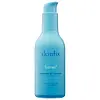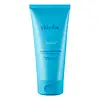What's inside
What's inside
 Key Ingredients
Key Ingredients

 Benefits
Benefits

 Concerns
Concerns

 Ingredients Side-by-side
Ingredients Side-by-side

Water
Skin ConditioningSodium Methyl Cocoyl Taurate
CleansingCocamidopropyl Hydroxysultaine
CleansingGlycerin
HumectantCaprylyl/Capryl Glucoside
CleansingSodium Cocoyl Isethionate
CleansingGlycol Distearate
EmollientBetaine
HumectantPanthenol
Skin ConditioningChondrus Crispus Extract
Skin ConditioningAloe Barbadensis Leaf Juice
Skin ConditioningGluconolactone
Skin ConditioningSodium Hyaluronate
HumectantJojoba Oil/Macadamia Seed Oil Esters
Skin ConditioningSqualene
EmollientPhytosteryl Macadamiate
Skin ConditioningPhytosterols
Skin ConditioningTocopherol
AntioxidantPropanediol
SolventHydroxypropyl Guar Hydroxypropyltrimonium Chloride
Xanthan Gum
EmulsifyingPolyacrylate Crosspolymer-6
Emulsion StabilisingSodium Chloride
MaskingEthylhexylglycerin
Skin ConditioningCitric Acid
BufferingBenzoic Acid
MaskingPhenethyl Alcohol
MaskingPentylene Glycol
Skin ConditioningTrisodium Ethylenediamine Disuccinate
T-Butyl Alcohol
PerfumingSodium Hydroxide
BufferingSodium Benzoate
MaskingPhenoxyethanol
PreservativeWater, Sodium Methyl Cocoyl Taurate, Cocamidopropyl Hydroxysultaine, Glycerin, Caprylyl/Capryl Glucoside, Sodium Cocoyl Isethionate, Glycol Distearate, Betaine, Panthenol, Chondrus Crispus Extract, Aloe Barbadensis Leaf Juice, Gluconolactone, Sodium Hyaluronate, Jojoba Oil/Macadamia Seed Oil Esters, Squalene, Phytosteryl Macadamiate, Phytosterols, Tocopherol, Propanediol, Hydroxypropyl Guar Hydroxypropyltrimonium Chloride, Xanthan Gum, Polyacrylate Crosspolymer-6, Sodium Chloride, Ethylhexylglycerin, Citric Acid, Benzoic Acid, Phenethyl Alcohol, Pentylene Glycol, Trisodium Ethylenediamine Disuccinate, T-Butyl Alcohol, Sodium Hydroxide, Sodium Benzoate, Phenoxyethanol
Water
Skin ConditioningSodium Cocoyl Isethionate
CleansingCoco-Glucoside
CleansingKaolin
AbrasiveCoco-Betaine
CleansingCoconut Alcohol
EmollientHydrogenated Coconut Acid
EmollientStearyl Alcohol
EmollientMaltooligosyl Glucoside
Skin ConditioningPropanediol
SolventTitanium Dioxide
Cosmetic ColorantBetaine
HumectantBehenyl Alcohol
EmollientSimmondsia Chinensis Seed Oil
EmollientAloe Barbadensis Leaf Juice Powder
Skin ConditioningSodium Isethionate
CleansingHydroxypropyl Methylcellulose
Emulsion StabilisingSodium Chloride
MaskingHydrogenated Starch Hydrolysate
Humectant1,2-Hexanediol
Skin ConditioningMontmorillonite
AbsorbentCaprylhydroxamic Acid
Trisodium Ethylenediamine Disuccinate
Xanthan Gum
EmulsifyingSodium Hydroxide
BufferingWater, Sodium Cocoyl Isethionate, Coco-Glucoside, Kaolin, Coco-Betaine, Coconut Alcohol, Hydrogenated Coconut Acid, Stearyl Alcohol, Maltooligosyl Glucoside, Propanediol, Titanium Dioxide, Betaine, Behenyl Alcohol, Simmondsia Chinensis Seed Oil, Aloe Barbadensis Leaf Juice Powder, Sodium Isethionate, Hydroxypropyl Methylcellulose, Sodium Chloride, Hydrogenated Starch Hydrolysate, 1,2-Hexanediol, Montmorillonite, Caprylhydroxamic Acid, Trisodium Ethylenediamine Disuccinate, Xanthan Gum, Sodium Hydroxide
 Reviews
Reviews

Ingredients Explained
These ingredients are found in both products.
Ingredients higher up in an ingredient list are typically present in a larger amount.
Betaine is a common humectant (a substance that promotes retention of moisture). It's known to be gentle on the skin and can help balance hydration.
This ingredient is best for improving hydration and soothing irritated skin. Studies also show it helps even out skin tone.
Fun fact: Betaine is naturally created in the skin and body. The kind found within cosmetic products can be either plant-derived or synthetic.
Another name for betaine is trimethylglycine.
Learn more about BetainePropanediol is an all-star ingredient. It softens, hydrates, and smooths the skin.
It’s often used to:
Propanediol is not likely to cause sensitivity and considered safe to use. It is derived from corn or petroleum with a clear color and no scent.
Learn more about PropanediolChances are, you eat sodium chloride every day. Sodium Chloride is also known as table salt.
This ingredient has many purposes in skincare: thickener, emulsifier, and exfoliator.
You'll most likely find this ingredient in cleansers where it is used to create a gel-like texture. As an emulsifier, it also prevents ingredients from separating.
There is much debate on whether this ingredient is comedogenic. The short answer - comedogenic ratings don't tell the whole story. Learn more about comegodenic ratings here.
The concensus about this ingredient causing acne seems to be divided. Research is needed to understand if this ingredient does cause acne.
Scrubs may use salt as the primary exfoliating ingredient.
Learn more about Sodium ChlorideSodium cocoyl isethionate is a natural ingredient from coconut oil. It is an ultra gentle cleanser that gives a nice foam without drying the skin or impacting the skin barrier.
The amount of foam created depends on the amount of sodium cocoyl isethionate used in the product.
This ingredient also helps improve the spreadability of a product.
Learn more about Sodium Cocoyl IsethionateSodium Hydroxide is also known as lye or caustic soda. It is used to adjust the pH of products; many ingredients require a specific pH to be effective.
In small amounts, sodium hydroxide is considered safe to use. However, large amounts may cause chemical burns due to its high alkaline.
Your skin has a natural pH and acid mantle. This acid mantle helps prevent harmful bacteria from breaking through. The acid mantle also helps keep your skin hydrated.
"Alkaline" refers to a high pH level. A low pH level would be considered acidic.
Learn more about Sodium HydroxideTrisodium Ethylenediamine Disuccinate is used to help stabilize a product.
It is a chelating agent, meaning it helps prevent metal ions from binding to other ingredients. This prevents unwanted reactions in products. Metal ions can come into a product via the water ingredient. They are found in trace amounts and are not known to be harmful.
Water. It's the most common cosmetic ingredient of all. You'll usually see it at the top of ingredient lists, meaning that it makes up the largest part of the product.
So why is it so popular? Water most often acts as a solvent - this means that it helps dissolve other ingredients into the formulation.
You'll also recognize water as that liquid we all need to stay alive. If you see this, drink a glass of water. Stay hydrated!
Learn more about WaterXanthan gum is used as a stabilizer and thickener within cosmetic products. It helps give products a sticky, thick feeling - preventing them from being too runny.
On the technical side of things, xanthan gum is a polysaccharide - a combination consisting of multiple sugar molecules bonded together.
Xanthan gum is a pretty common and great ingredient. It is a natural, non-toxic, non-irritating ingredient that is also commonly used in food products.
Learn more about Xanthan Gum